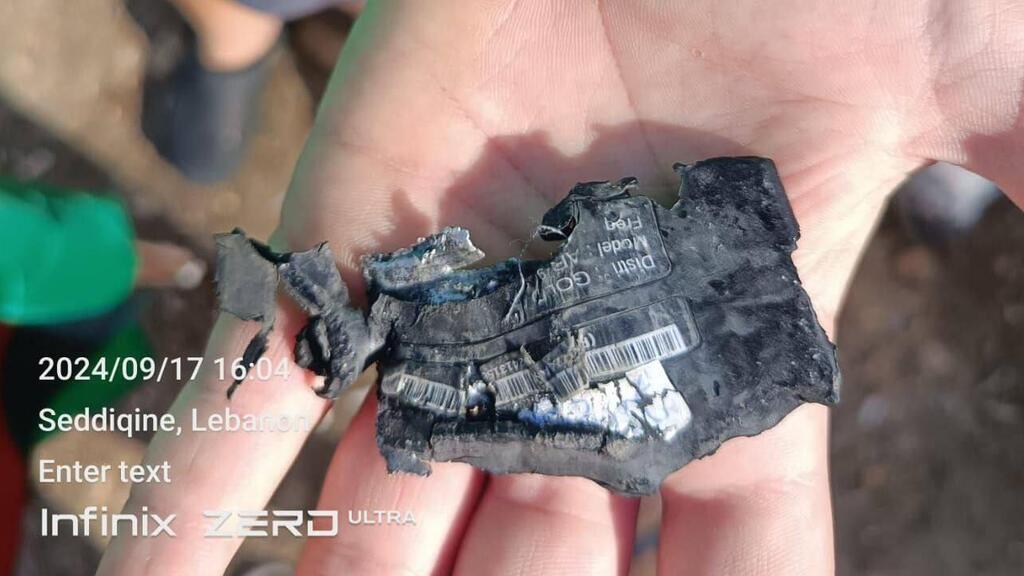Security officials arrive at Gold Apollo’s Taiwan office as company’s president addresses reporters, denying responsibility for pager explosions in Lebanon; devices reportedly made by Budapest-based BAC which has unclear ties to Middle East and EU
The model of pagers used in detonations in Lebanon was made by Budapest-based BAC Consulting KFT, Taiwanese pager firm Gold Apollo said on Wednesday, adding it had only licensed out its brand to the company and was not involved in the production of the devices.
At least nine people were killed and nearly 3,000 wounded when pagers used by Hezbollah members detonated simultaneously across Lebanon on Tuesday. According to a senior Lebanese security source and another source, explosives inside the devices were planted by Israel's Mossad spy agency.

Gold Apollo
(Photo: REUTERS/Ann Wang)
Gold Apollo was identified through photos of the devices, based on stickers and their design. A Lebanese security official said Hezbollah had ordered 5,000 beepers from the company, believing they would provide more secure communication than cellphones.
"The product was not ours. It was only that it had our brand on it," Gold Apollo founder and president, Hsu Ching-kuang, told reporters at the company's offices in the northern Taiwanese city of New Taipei on Wednesday.

Hsu Ching-Kuang
(Photo: Yan ZHAO / AFP)
The company said in a statement that the AR-924 model was produced and sold by BAC. According to Hsu, payments from BAC had been "strange" and came through the Middle East.
BAC’s website, filled with generic images, lists its CEO and founder as Cristina Arcidiacono-Barsony, and claims the company specializes in consulting across various fields including environment, development and international relations. The official address provided is a private residence in Budapest.

Website of BAC consulting
The website offers little detail on specific projects or clients, instead featuring vague descriptions and stock images. One project lists the European Union as a client, though the accompanying text is sparse and lacks specifics. Another claims the company helped develop technology and a "business bridge" in Asia, again with no clear details.
Gold Apollo authorized "BAC to use our brand trademark for product sales in specific regions, but the design and manufacturing of the products are entirely handled by BAC," the statement said.

Reuters calls and emails to BAC on Wednesday morning were not answered.
Hsu said earlier there had been problems with remittances from the firm.
"The remittance was very strange," he said, adding that payments had come through the Middle East. He did not elaborate further.
Hezbollah fighters began using pagers in the belief they would be able to evade Israeli tracking of their locations, two sources familiar with the group's operations told Reuters this year.

AR924 pager
Hsu said he did not know how the pagers could have been rigged to explode.
While Hsu was meeting with reporters, police officials arrived at the company. Officials from Taiwan's economy ministry also visited Gold Apollo.
The ministry said in a statement that there was no record of direct pager exports from Taiwan to Lebanon.
Hsu also said Gold Apollo was a victim of the incident and planned to sue the licensee.

A pager that exploded in Lebanon
"We may not be a large company but we are a responsible one," he said. "This is very embarrassing."
Oleg Brodet, from the Cyber Labs at Ben-Gurion University, suggested the operation took years to execute, noting the complexity of supply chain cyberattacks. "To send a 'compromised' device, changes must be made during manufacturing or shipping. We believe something similar happened here, where devices intended for the terrorist organization were altered," he said.
Lt. Col. (res.) Dr. Eyal Pinko told Ynet: "This isn’t science fiction. Many countries possess such capabilities. If we go back 14 years, there was a virus that targeted the Natanz nuclear facility, an operation attributed to Israel, which crippled Iran’s enrichment program."
Apollo Gold firm says devices made by BAC company, based in Budapest
Anadolu staff |18.09.2024 -

A Taiwanese firm Gold Apollo on Wednesday denied making pager devices that exploded in Lebanon.
In a statement, the company said Apollo Gold Corporation has established a long-term private label authorization and regional agency cooperation with BAC company, which has a license to use its brand.
"According to the agreement, we authorize BAC to use our brand trademark for product sales in specific regions, but the design and manufacturing of the products are entirely handled by BAC," it said.
The BAC Consulting KFT is based in Budapest, the capital of Hungary.
"Regarding the recent media reports about the AR-924 pager, we clarify that this model is produced and sold by BAC. We only provide brand trademark authorization and have no involvement in the design or manufacturing of this product," it further said.
Earlier, the company founder Hsu Ching-kuang also denied any involvement of his company in making of the said pager.
The Israeli intelligence agency Mossad planted explosives in the batteries of pager devices that detonated Tuesday in Lebanon, killing nine people and injuring around 2,750 others, including 200 in critical condition, according to Sky News Arabia channel.
The New York Times, citing officials who spoke on condition of anonymity, said the pagers the Lebanese group ordered from Gold Apollo in Taiwan had been tampered with before arriving in Lebanon.
*Writing by Islamuddin Sajid

2024-09-17
Shafaq News/
At least nine people were killed and nearly 3,000 wounded when the pagers detonated simultaneously across Lebanon on Tuesday.
"The product was not ours. It was only that it had our brand on it," Hsu Ching-Kuang told reporters on Wednesday.
The company said in a statement that the AR-924 model was produced and sold by BAC.
"We only provide brand trademark authorization and have no involvement in the design or manufacturing of this product," the statement said.
Hsu earlier said that the firm with the license was based in Europe but later declined to comment on BAC's location.
While Hsu was meeting with reporters, police officials arrived at the company.
Hezbollah had instructed its members to avoid using mobile phones since the beginning of the Gaza conflict, instead relying on a proprietary telecommunications network to avoid potential Israeli surveillance.
Hsu said that he "did not know how the pagers could have been rigged to explode."
Iran-backed Hezbollah said it was carrying out a "security and scientific investigation" into the causes of the blasts.
Precision warfare takes a darker and more individualized direction
Mick Ryan
Sep 18, 2024

In the past 24 hours, nearly 3000 pagers carried by members of the terrorist group Hezbollah exploded across Lebanon. This audacious and imaginative attack on Hezbollah killed at least nine people and injured thousands. While no organisation or country has admitted responsibility for the attack, many, including Hezbollah itself, have pointed the finger at Israel.
If Israel was responsible, it will carry profound implications for Hezbollah and its leadership.
First, Israel is demonstrating that it can identify and target members of Hezbollah regardless of their location or position in the organisation. This is indicative (again) of a sophisticated Israeli intelligence apparatus, which despite its failures leading up to the 7 October Hamas massacres, can execute complex and audacious attacks.
Second, Israel is responding asymmetrically to Hezbollah rocket attacks on northern Israel. These rockets, while improving in accuracy, are generally indiscriminate in who they affect in Israel. Hezbollah has shown no distinction between civilians and military targets. Israel however, with these pager attacks, has shown that it can respond not only with aerial bombardment but in a more discriminate and imaginative way.
Third, Israel (if it did conduct the attacks) is saying to Hezbollah’s leadership that it can and will reach out personally, and that it can remove entire layers of the Hezbollah chain of command instantly. Doing so will cause confusion in Hezbollah’s ranks and significantly degrade its ability to plan and coordinate large-scale attacks on Israel.
Finally, the Israelis have demonstrated that they are inside Hezbollah’s communications networks and its supply chains. This will give every member of Hezbollah pause to reconsider whether to trust the communications and other equipment issued by the organisation. But more generally, the Israelis have shown they can intercept and tamper with supplies bound for Hezbollah. What else might they have tampered with?
There are implications for Australia in this attack.
You can read my full article (for free) at the Lowy Institute site here.
How does a pager work? Here's why Hezbollah used low-tech devices instead of smartphones
At least nine people were killed and around 3,000 injured after pagers used by Hezbollah operatives exploded in Lebanon and Syria
Web Desk Updated: September 18, 2024

At least nine people were killed and around 3,000 injured after pagers used by Hezbollah operatives exploded almost simultaneously in Lebanon and Syria on Tuesday.
How does a pager work?
A pager is pre-mobile phone era telecommunication device which transmits radio signals from its network through a specific frequency. The AR 924 pager used by the Hezbollah did not allow phone calls and were used to communicate via text messages.
ALSO READ: How Israel's Mossad planted explosives in Hezbollah devices and detonated them remotely
Iran-backed Shia group Hezbollah believes that the explosives were planted by Israeli spy agency Mossad in the pagers during the production stage itself. Lebanon security officials claimed the pagers were manufactured by Gold Apollo, a Taiwanese firm.
However, Gold Apollo stated that it did not manufacture the AR 924 pagers, which it claimed were actually produced by BAC, a company which has a licence to use Gold Apollo's brand.
Why did Hezbollah use pagers instead of smartphones?
Hezbollah Secretary General Hassan Nasrallah on February 13 warned the group's supporters that their phones were more dangerous than Israeli spies. He advised them to break, bury or lock them in an iron box.
Following this, the paramilitary group ordered around 5,000 Taiwanese AR 924 pagers. The choice to switch to pagers was simple: They allowed Hezbollah evade location tracking by Israel as they did not have cameras or allow telephone calls. They also have a low digital signature.









